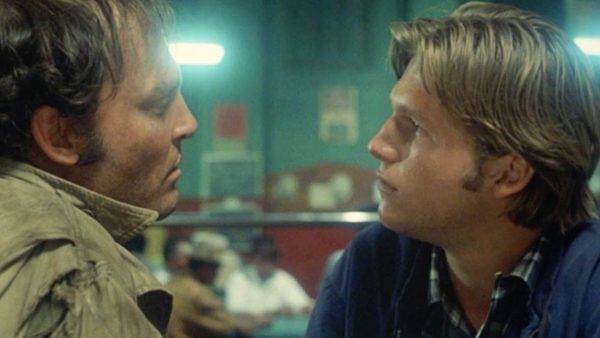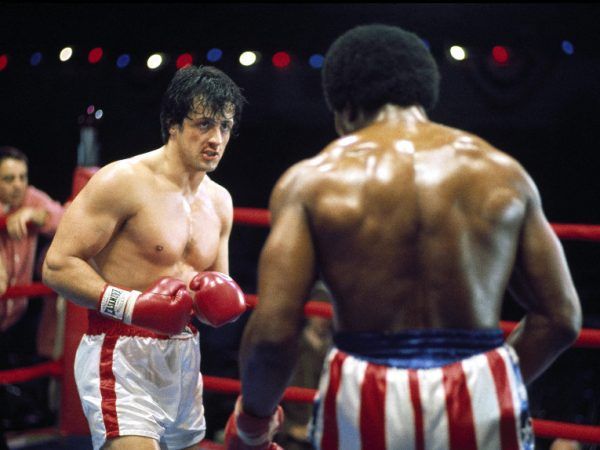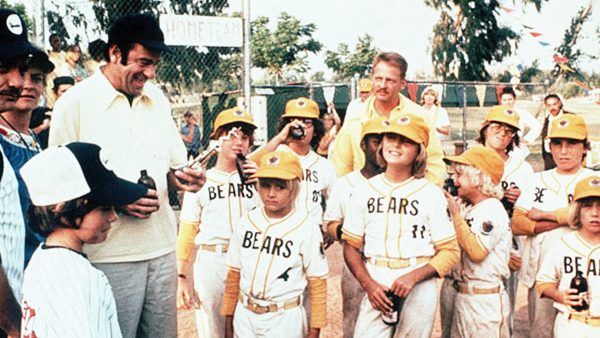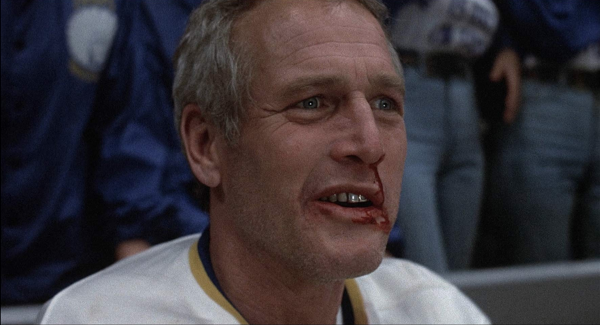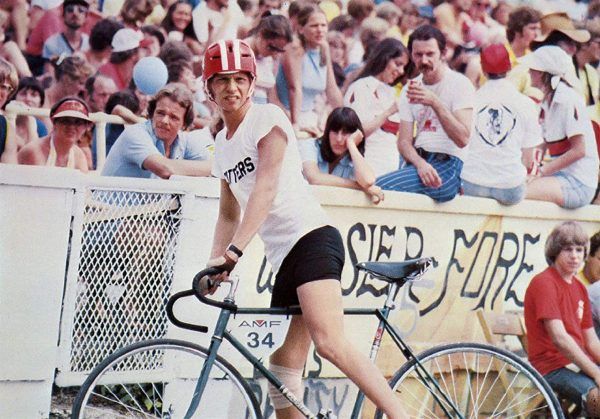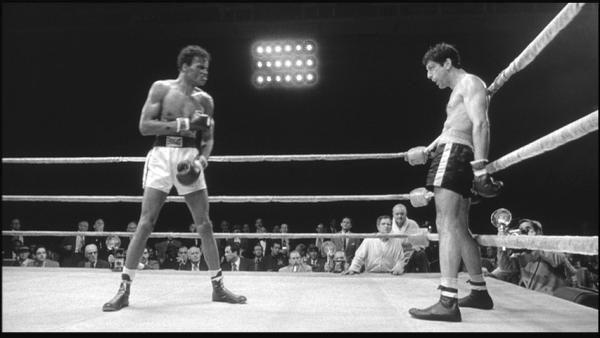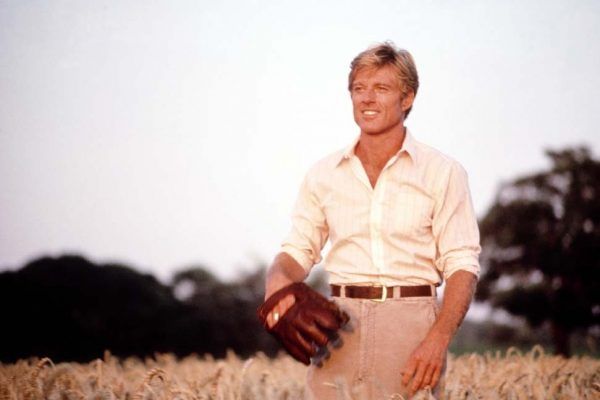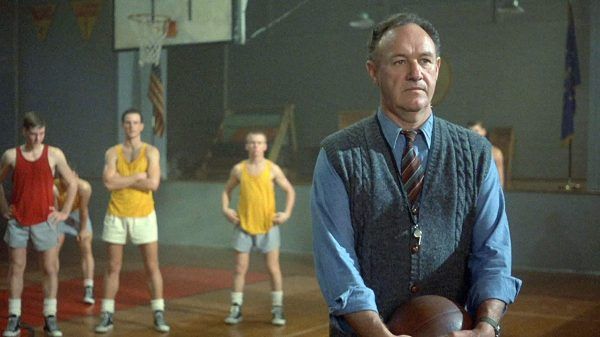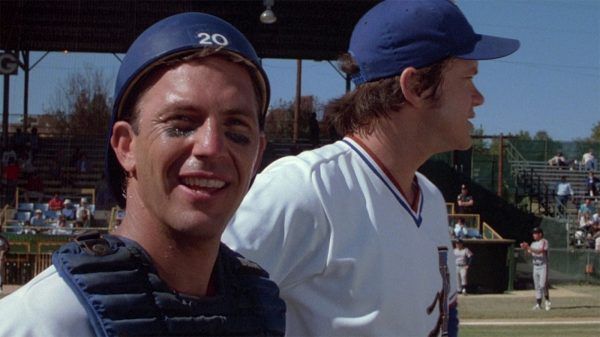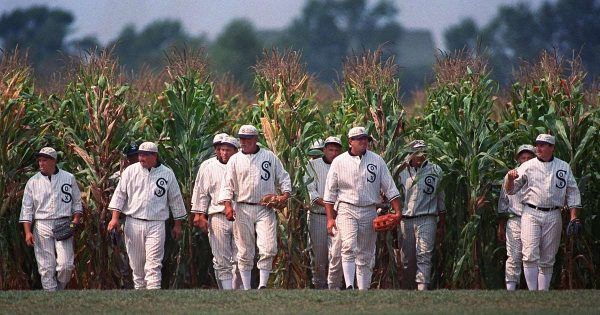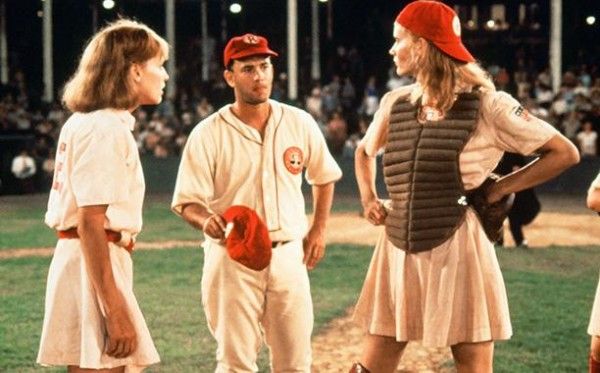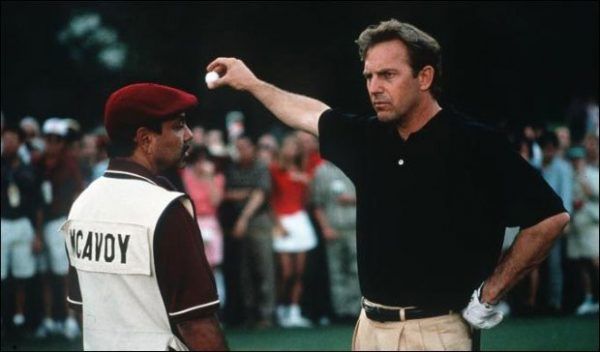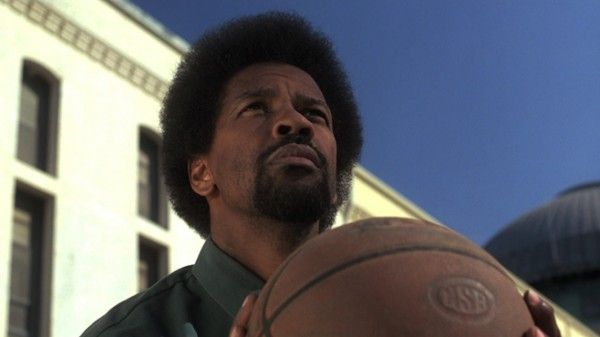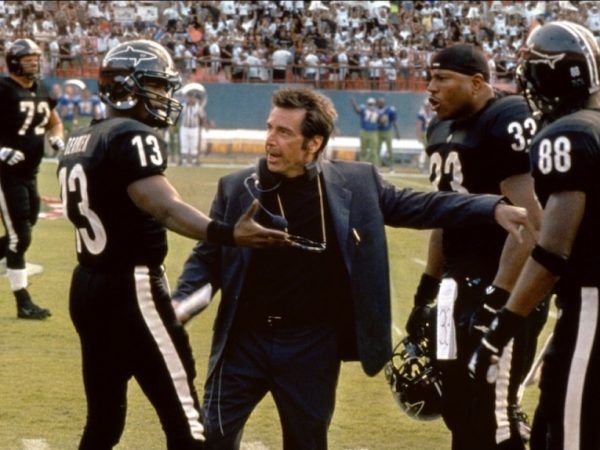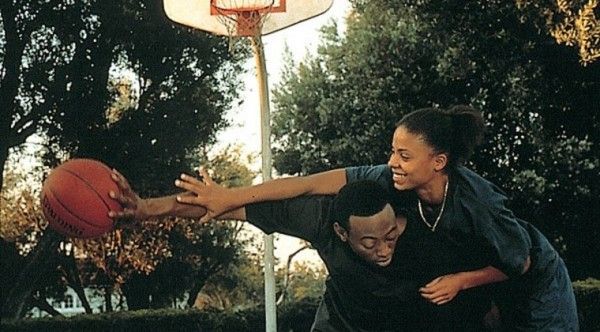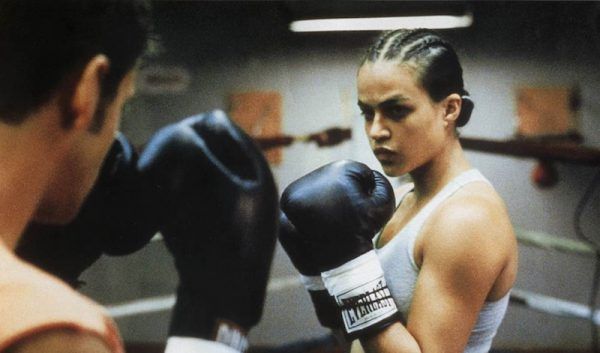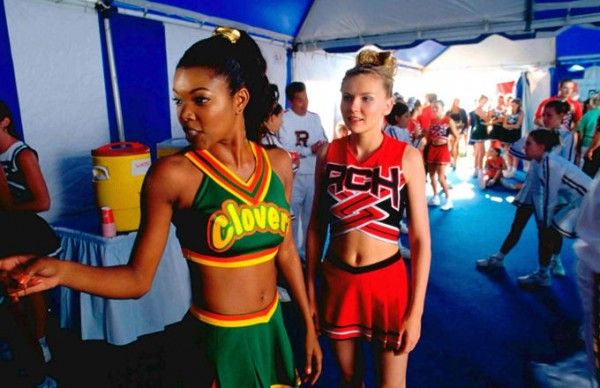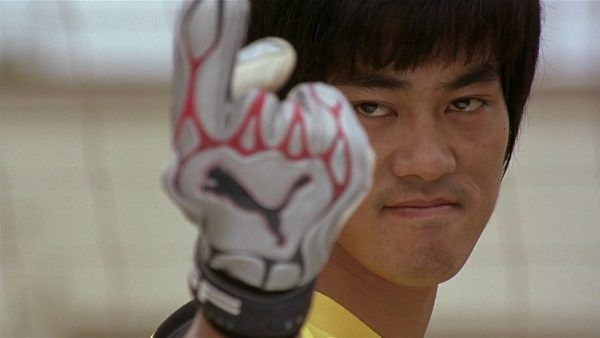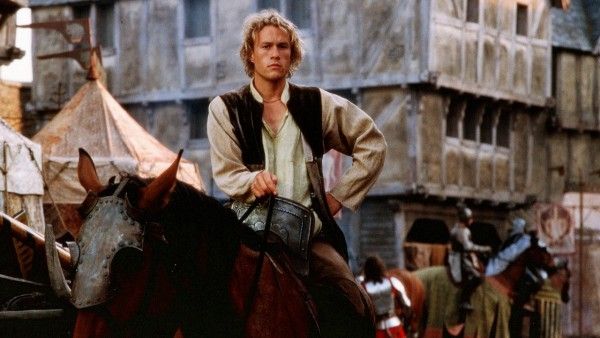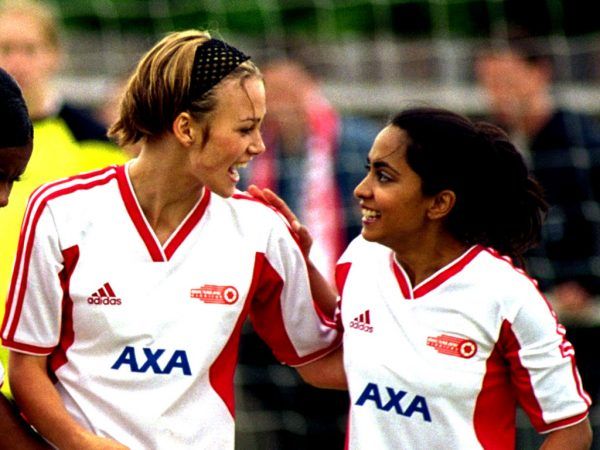Tears and cheers, wins and losses, hard lessons and sweet triumphs -- sports movies run the gamut of emotions and can be as emotionally taxing on audiences as they are physically exhausting on the actors. The subgenre is home to some of the most effective tear-jerkers around. An underdog pushing themselves to achieve the ultimate dream is inherently moving, and this wish-fulfillment is an integral part of the sports movie formula. Seeing someone realize a dream is an inspiring feeling and a reminder of what’s possible. It feels good watching someone else achieve their purpose, especially if they work as hard as athletes do to earn it.
Not all the movies listed below are feel-good movies—many of them are far from it. But these are the films that have audiences moving in their seats like spectators at a real game, because they believe in the MVP performances on-screen, delivering visceral and exhilarating experiences. It’s why most of these titles have stood the test of time.
Typically, in the best of sports movies, the characters are as enchanting off the playing field. Many of these classics share that in common: the heroes entertain as much as the sport they play. It’s the characters that make most of these movies the classics we remember.
Note: This list of the 25 best sports movies doesn’t include documentaries, hence no Hoop Dreams and Murderball.
For even more Collider "best of" lists, check out our lists of the best Westerns, Thrillers, Space Movies, and War Movies.
Fat City (1972)
John Huston's down-in-the-gutters, far-from-pretty boxing drama reeks of desperation in every frame. There’s nothing inspiring about the bleak drama. It's a fitting double feature with The Wrestler, highlighting the pain of a sport that doesn't always love you back. As Rocky Balboa said, “You gotta be a moron to wanna be a fighter, ya know what I mean?” Fat City is about those morons, for the most part.
Jeff Bridges plays the promising young boxer Ernie, whose life could turn for the worse like long-gone boxer Tull (Stacey Keach). Just looking at Keach broken down and rotting draws empathy in Fat City. There's not even much boxing in Fat City, but boy do these characters take the punches and get knocked down enough in their daily lives. The hardships are outside of the ring, which is where Huston shows most of the damage inflicted in his drama more about boxers than the sport itself. Huston’s movie is like a depressing Tom Waits song come to life.
Rocky (1976)
The Best Picture winner is a classically simple but meaningful underdog story, which only grows deeper as the years go by. It's an incredible journey for the Italian Stallion (Sylvester Stallone), who we first meet boxing for peanuts and throwing punches for the mob. In the end, he gives heavyweight champion, Apollo Creed (Carl Weathers), the fight of his career. Rocky loses, but he wins by having the love of his life by his side, Adrian (Talia Shire). When he screams her name at the end, bloody and fulfilled, it’s always moving. The movie is jam-packed with those heart-string pulling moments – all showing the beauty, heartache, and passion in a guy who finally proves himself. It's a special movie, and after watching how wise and hardened Balboa grows throughout the other sequels, including Rocky Balboa and the Creed movies, his first performance as the naive young boxer becomes all the more poignant.
The Bad News Bears (1976)
The best hangout movie of all the sports movies. Too many films about the game short change side characters, but not The Bad News Bears. The entire foul-mouthed little league team has nothing but personality: there’s the best player on the team, Amanda Whurlitz (Tatum O’Neal); the dirt bike-riding bad boy of the league, Kelly Leak (Jackie Earle Haley); the most obnoxious of them all, Engelberg (Gary Lee Cavagnaro); and the list goes on. The young actors are never lost in Walter Matthau's mighty shadow; he’s tremendous in Bad News Bears as Coach Morris Buttermaker. What a name, what a character, and what a performance. Bad News Bears has a lot of laughs, but it's Buttermaker's arc that transcends it all.
There's plenty of movies where the coach is changed by his players, but it's rarely as subtly expressed by Matthau as it is in Michael Ritchie’s film. Watching Buttermaker grow very slowly but surely by the end of the movie, and give his all to the team during the thrilling final game against the snotty no-good Yankees, it’s genuine and earned. Matthau brings nothing but authenticity to this classic comedy.
Slap Shot (1977)
Not all of Slap Shot stands the test of time, but as a whole, George Roy Hill’s movie remains the reigning champ of crass but heartfelt sports comedies. The entire Charlestown Chiefs score laughs, as they're led by veteran coach and player, Reggie (Paul Newman), who’s being pushed out the door. The team ain't the best of the best, but they love the game, no matter how poorly they play it. It's endearing how bad the Chiefs are – which is why they get disbanded – yet stay dedicated to the game.
There are speed and energy to the hockey games unmatched by most depictions of the sport. Even Hill’s low-angle shots show views of the game rarely seen. As grimy as Slap Shot is, it’s visually dazzling at times, whether Reggie is on the ice or listening to Fleetwood Mac. Credit must go to Nancy Dowd’s script, which has no shortage of laugh-out-loud bits and characters. The Hanson Brothers are wonderful creations and a comedy trio that’d be the MVPs of the movie if it wasn’t for Newman’s untouchable charisma. Even when Newman plays a loser, he’s still the coolest guy in the room.
Breaking Away (1979)
Community is a large part of Peter Yates' feel-good picture Breaking Away. Set in Bloomington, Indiana, the movie’s almost more about the town than the cycling. There’s not even a whole lot of bicycle riding in the movie. It’s a hangout movie more about the boys on the bikes -- Dave (Dennis Christopher), Cyril (Daniel Stern), Moocher (Jackie Earle Haley) and Mike (Dennis Quaid) -- viewed as the weirdos and outcasts of their town. They’re seen as pariahs on the university campus, and sometimes, for good reason. Not always the most likable group of kids, but when they are, they are quick-witted and their exuberance is infectious. All these characters have to do is sit around, talk about basically nothing, and they’re a delight to watch. There’s always a warmness to Yates’ depiction of these goofs and the small town, which grow more purposeful as the light comedy goes along. There’s no corniness in Breaking Away, only basic truths to go along with the fun.
Raging Bull (1980)
No boxing movie hits harder than Martin Scorsese's biopic about madman boxer Jake LaMotta (Robert De Niro). Even when its ferocious boxing matches are bloodless, they're chilling, almost out of a horror movie because of the combined intensity of Scorsese's camerawork, Thelma Schoonmaker's editing, and De Niro's terrifying performance. De Niro couldn't have lived more up to the title of Raging Bull. He's frightening inside and outside of the ring. The looks he gives his hothead brother and trainer Joey (Joe Pesci), a child he meets and one day marries (Cathy Moriarty), and his opponents in the ring – they're frightening enough to scare off an army.
Even when LaMotta's mouth finally shuts and he's got that unnerving smile on his face, De Niro creates fear in other characters and the audience. Nothing needs to happen for him to flip the switch in his dim head. It's known as one of the most intense performances for an endless list of reasons, including the famous physical transformation. Per usual, Scorsese sugarcoats nothing and pulls no punch, which is why he was the perfect director for the brutality of LaMatta's story. It's all pain and anger, which are no strange traits in Scorsese's movies.
The Natural (1984)
Barry Levinson's period piece is borderline fantasy. There's just an aura of magic around aging ball player Roy Hobbs (Robert Redford), who had his young and promising career cut short by a terrible twist of fate. When he returns to the game, he's a mystery to the league, fans, and the woman he falls in love with, Iris Gaines (Glenn Close). Everyone wants to know, how did raw talent go so unnoticed?
Hobbs has a simple love of the game that runs deep in his bones and every frame of Levinson's lavish film, which is a lovely sight to the eyes. Everything is idealized and pronounced through Levinson and Hobbs' eyes. Baseball stadiums aren’t the most magical places on Earth, but they are in The Natural. The plot isn't always as compelling as Hobbs and his rise to greatness, but it's no matter. At the end, when Hobbs hits a miracle of a home run that shatters the lights in the ballpark, the triumph is what matters. It's a glorious win that is shot and scored like Hobbs is in heaven. The Natural isn't the deepest movie about the game, but it is one of the most nostalgic and loving.
Hoosiers (1986)
Imagine the possibilities if Gene Hackman was your coach in life. What could he not inspire you to do? He couldn't be more believable as the authoritative High School basketball coach Norman Dale, who inspires his players and townsfolk to be their best. Set in 1954, Indiana's Hickory Huskers are in a very Friday Night Lights environment with a town that concerns itself with High School basketball and not much else. The underdog story's archetypes, montages, and conventions have influenced too many sports movies to count, but it's a formula that works wonders in director David Anspaugh's Hoosiers.
The players and the town are authentic enough to make the most familiar of sports staples realistic. Of course, the movie is based on a true story, but Hoosiers’ conventions feel genuine and alive by always carrying its heart on its sleeve. There's not a moment that rings false in Hoosiers. Led by Hackman, Barbara Hershey, and Dennis Hopper (who won an Oscar for his performance), the impeccable performances elevate this classic small-town story.
Bill Durham (1988)
“I love winning, man. I fucking love winning, ya know what I'm saying? It's, like, better than losing.”
Dialogue usually doesn't get much better than Bill Durham's. Ron Shelton's script is packed to the brim with classic lines, including a passionate and raunchy speech from old-time ballplayer Crash Davis (Kevin Costner) about the game, soft-core porn, and his unpopular belief that Lee Harvey Oswald acted alone. The dialogue and laughs are golden in this movie, which appeals to anyone who couldn't care less about baseball.
Catcher “Crash” Davis' glory days are long behind him, but he's been tapped to instill some smarts in an up and coming pitcher, Ebby Calvin “Nuke” LaLoosh (Tim Robbins), who's not the sharpest tool in the shed by any stretch of the imagination. They're a great odd couple – one on his way up, one on his way out. They’re not alone in their love of the game and maybe each other, though. Annie (Susan Sarandon), a woman who adores baseball and baseball players, is another mentor, friend, and lover to LaLoosh. She’s famous for “helping” players up their game through a variety of methods. Costner, Sarandon, and Robbins turn in all-star performances. They're a blast to watch, and so is the rest of The Durham North Carolina Bulls. When the team gathers on the mound to contemplate a wedding gift for one of their teammates, they couldn’t be more endearing if they tried.
Field of Dreams (1989)
In need of a pick-me-up? Need a cry? Then watch Field of Dreams again, a movie that's the closest thing to a warm blanket. Director Phil Alden Robinson's classic never fails to ignite the waterworks. One day, farmer Ray Kinsella (Kevin Costner) hears a powerful whisper of a voice, telling him to build a baseball field on his cornfield. When he builds it, they do come: the spirits of long-dead ballplayers, including his father, John Kinsella (Dwier Brown).
The logline of Field of Dreams, based on W . P. Kinsella's book, could’ve been a complete cornball of a movie in the wrong hands, but it's all handled with such delicacy. Not once does a viewer question the presence of ball-playing ghosts in Iowa; we’re too close to Kinsella and his obsession to think twice about it. It’s a story about fathers and sons and dreams in the end, not ghosts playing the game again. There are real emotions in the unreal story, from beginning to end. “Hey dad, wanna have a catch?”
A League of Their Own (1992)
We all know “there’s no crying in baseball,” but that line delivered by the disgusting yet charming boozehound of a coach, Jimmy Dugan (Tom Hanks), is only one of the many unforgettable scenes from Penny Marshall’s baseball picture. Set during World War II, men have gone off to war and a man (Garry Marshall) in the candy business invests in an all-female baseball league.
The best ballplayers in the Midwest finally get their chance to take the field, like sisters Dottie Hinson (Geena Davis) and Kit Keller (Lori Petty). They initially play together under the “coaching” of Dugan, a former MLB star who lost his talent in booze, and they’re surrounded by the appealing likes of Madonna, Rosie O’Donnell, and a long list of actresses that leave serious impressions in fewer scenes. The Rockford Peaches are one charismatic and uproarious group of athletes.
Marshall does a remarkable job of telling a story that’s light on its feet but not without stakes and something to say about gender politics and sibling rivalries (but not so much race). There’s more to A League of Their Own than the relationships on the team, but those relationships are still the highlight of the movie, especially the respect earned between Dugan and Dottie. They only grow to respect and like each other, nothing more. The movie earns every moment in their slow-building friendship. Marshall handles all the relationships with such care and love.
Tin Cup (1996)
Why yes, Kevin Costner is the king of sports movies. The romantic golf comedy is another fun, sexy, and charismatic movie knocked out of the park by Ron Shelton. The director of Bull Durham and White Men Can't Jump (consider this an honorable mention) took the most boring sport of all to watch and made it more exciting than ever with Costner and Renee Russo. Costner again plays an athlete in the back half of his career, similar to Crash Davis in Bull Durham. It's a familiar archetype Costner breathes so much life and entertainment into, the kind of role he crushes. He’s naturally charismatic enough to make these crusty characters likable enough to root for them, flaws and all.
Tin Cup is a movie with a lot of star power colliding between Costner and Russo, whose chemistry is as electric as the final match in the movie. It’s a genuinely surprising finale, which we’re not always used to seeing in the subgenre. Watching the stubborn McAroy's worst qualities come to light again and causing him to sabotage himself to prove a point, now that's an ending.
He Got Game (1998)
“Poetry in motion” is how the most promising High School basketball in America describes basketball, and that’s exactly how Spike Lee shoots the game in his atmospheric drama. Lee -- the most famous New York Knicks fan ever -- shoots the game with such love and artistry. In the opening credits alone, which show men and women all over the country shooting hoops, there’s a striking beauty to the graceful passes, moves, and shots. Visually, He Got Game is a marvel with as much purity as the sport.
Jesus Shuttlesworth (Ray Allen) faces pressure from everyone and their uncle about choosing between college and the NBA -- including his girlfriend (Rosario Dawson), sharp-tongued agents, and his family. The business of the game is hell, but the game itself is heaven in He Got Game. Lee treats these players like artists threatened by outside forces with the money in their pockets.
The greatest weight on Jesus’ shoulders is his father, Jake Shuttlesworth (Denzel Washington), who went to jail for manslaughter. Shuttlesworth, who pushed Jesus hard to be a champion, is released from jail by the governor to persuade his son to go to his alma mater. Believable? Who cares. If Shuttlesworth succeeds and gets his son to sign a letter of intent, he’ll see an early release. The story concludes in an epic final game between father and son, the most important game of Jesus’ career. It plays as monumental as an NBA or NCAA championship. Few final matches are so epic and intimate, which is true for the rest of He Got Game.
Any Given Sunday (1999)
The most flawed movie on the list, but my God, that speech at the end can make any of the movie's many indulgences and flaws go unnoticed. “Life is a game of inches” is a speech that sings and inspires, and completely rocks hockey arenas in real life. It’s when we see the brilliant but tired Miami Sharks coach, Tony D’Amato (Al Pacino), come alive again.
Reviews were mixed for Oliver Stone's epic football drama, but he gets as close and intense as anyone ever has with the game on film. The hits are like car crashes. The violence is stomach-churning. The behavior on and off the field is sickening. It's not a glamorous view of professional football, but instead a look at the good, the bad, and the evil of it. Once again, Stone takes aim at those in power, like Sharks owner Christina Pagniacci (Cameron Diaz) and the league’s commissioner (Charlton Heston). The money men poison a game Stone views as primal and violent as the roman games, which he's not subtle about. Any Given Sunday isn't a subtle movie, but neither is Stone or the sport; it doesn't need subtlety. It’s a sledgehammer of a movie with Stone's fast and furious shooting and cutting, which depicts the game in a whole new light.
There’s an element of body horror -- a player’s eye literally pops out of his skull! -- that heightens the pain and intensity of it all. The movie could've been solely focused on any of its main characters – coach, Willie (Jamie Foxx), Jack “Cap” Rooney (Dennis Quaid), you name it – and Any Given Sunday would've still been immersive. Everyone's story is a compelling story, often depicting issues still plaguing the NFL today. The three-hour drama is Stone's most inspired and flawed epic of his 21st-century career.
Love & Basketball (2000)
Writer-director Gina Prince-Bythewood ditches the cliches in favor of something more real. Love & Basketball is always driven by its characters, Monica Wright (Sanaa Lathan) and Quincy McCall (Omar Epps), not conventions. Prince-Bythewood’s film is about the evolution of two basketball players, starting from childhood, moving on to High School, and then eventually, pro ball. They’ve been in love since childhood, and their love for each other and basketball is equally intense and real.
Since Prince-Bythewood was a ballplayer herself, born the same year as Monica Wright, there’s realism to the games and players. The filmmaker lets audiences into the mind of an athlete in a way few sports movies have. There’s one game featuring voice-over and point-of-view shots that let you really feel what Monica is experiencing on the court. It’s a thrilling moment in a movie that doesn’t go for grandiose sports drama with championship games and big speeches. Love & Basketball has as many crushing failures, personal and professional, as wins. Dreams don’t always come true is a refreshing and important message to remember in the subgenre.
Girlfight (2000)
Director Karyn Kusama (The Invitation) presents the beauty of a sport without hyperbole or aggrandizing one iota in her feature directorial debut. The filmmaker pulls boxing right back down to reality, where not every punch is epic or in slo-mo, and where there’s not a happy ending for everybody. There’s nothing cliche about Girlfight, which has its fights hit harder because the characters and the world around the fights couldn’t be more believable. Starring Michelle Rodriguez as an outcast teen living with her brother and her unsupportive father in the projects, it’s a sports drama with more character and atmosphere than cliches. Girlfight has the excitement expected from a boxing picture, as well as a sense of wonder that comes with Rodriguez’s character stepping into the ring and finding her identity.
Gene McDaniels and Theodore Shapiro’s score, in particular, deserves serious acclaim and brings excitement to the boxing matches with a subtlety perfect for Kusama’s direction. The clapping in the score is so simple but creates both intensity and fluidity in the fights. It’s as elegant as the rest of the movie, which ends in victory without an athlete getting everything she wants. In one of the movie’s most poignant and real scenes, Diana (Rodriguez) asks her trainer (played by Jaime Tirelli) what it takes to be great. He doesn’t know, he says. There’s no big speech or heartbreaking admission from her trainer, just a simple acknowledgement he doesn’t have the answer. It’s beyond him. It’s one of those moments that hits the truth on the head, and Girlfight is spectacular because of those scenes.
Bring It On (2000)
What a great slice from year one of the 21st century. Bing It On far exceeded expectations upon its theatrical release, and Peyton Reed’s (Ant-Man) is now even more beloved than it was then. It’s a “cheerleader comedy” that never grows stale thanks to Kirsten Dunst’s pep, a spirited ensemble around her, and a stellar sense of humor. Spirit fingers? Fantastic. The montage of cheerleader tryouts? Wonderful. Even a fart joke in Bring It On brings the laughs. It’s such a quick and sharp movie and about as fast as the screwball comedies Reed’s filmography is heavily influenced by.
Almost all the way through Bring It On’s brisk plot, the comedy remains timeless. Yes, it’s only about 20 years old, but nonetheless, very little dates Bring It On. It’s as fresh and lively as the day it came out, which is a rare fate for any movie. The comedy even has surprises to go along with the laughs. Jessica Bendinger’s (Stick It) marvelous script wisely lets the competition -- The East Compton Clovers (led by Gabrielle Union) -- defeat the Toros at the end in the big cheerleader competition. The Toros cheerleader come in second place, but they win by playing fair, by being original, and having a damn good time while doing it. It’s another happy ending in which the team isn’t no. 1 at the end and doesn’t need to be.
Shaolin Soccer (2001)
Another miracle of a movie packed to the brim with whimsy and spectacle from director extraordinaire Stephen Chow (Kung Fu Hustle), who fills every frame with unlimited fun in his kung fu soccer movie. It’s pure glee. Shaolin Soccer moves at such ferocious speed without ever tiring itself or an audience out, consistently tops each soccer match, and the laughs never cease, only increase.
Once again, Chow delivers the full-package with an action-comedy. He’s such an artist at balancing action and laughs, not to mention his bedazzling visuals. Inconsistent CGI aside, it’s quite a sight witnessing a soccer ball going at the speed of light turning into a fire tiger or a soccer match turning into a war zone for the film’s hero, Mighty Steel Leg Sing (Chow), who is recruited by a former soccer legend to lead a team of Shaolin masters to victory in a tournament.
The romance between Sing and Mui (Zhao Wei) is a real breath of fresh air for sports movies: Mui doesn’t sit on the sidelines but joins in on the fun at the end, as well as saves the day for Sing’s team of misfits. It’s one of the many, many joyous moments from Shaolin Soccer. Chow’s film is a visual marvel with a heart as epic as its spectacle.
A Knight's Tale (2001)
Acclaimed screenwriter Brian Helgeland's directorial debut is such a lovable movie. The medieval sports tale has endless entertainment value to offer with its stellar cast of characters, its rocking soundtrack, and its winning sense of humor. A Knight's Tale is a feel-good movie with the right amount of drama to raise the stakes in the underdog story, led by a charming-as-all-hell Heath Ledger. It's a great movie star performance, and the rest of the ensemble is every bit as entertaining as their leading man. Paul Bettany, along with the rest of the movie, is a marvel when he’s bellowing out speeches to pump up the crowd. What a spectacular showman in a movie starring nothing but scene-stealers, all playing off each other like a team at the top of their game.
Helgeland doesn’t falter in crafting a real deal romantic comedy, either. Ledger and Shannyn Sossamon are a delightful pairing. The crowd-pleaser doesn't slump on the love story; it's as integral as the games. Sossamon doesn't play a love interest that only sits on the sidelines rooting for the hero, although she does that quite well too, but it’s still a character bursting with as much personality as Will and the gang. A Knight's Tale and its band of sharp characters never fails to entertain.
Bend It Like Beckham (2002)
For starters, what a great, everlasting title by the co-writer and director of the soccer film, Gurinder Chada (Blinded by the Light). People couldn’t shut about the title or the movie itself back in 2002, and for one good reason -- it’s a constant delight, a crowd-pleaser with something fresh and new to say. The London-set story, which is about a teenager (Parminder Nagra) in love with soccer despite her loving but strict Indian parents’ disapproval, isn’t the same story of the underdog we’ve seen countless times. Chada shows an entirely different perspective and set of struggles a player can face with a culture clash.
Bend it Like Beckham takes a serious conflict, explores it thoroughly, and yet still manages to play as a sublime soccer comedy. There’s such an infectious lightness to go along with the drama in Chada’s film. The laughs are dependable, Nagra and Keira Knightley are a smashing pair as buddies/teammates, the soccer matches are sunny and vibrant, and the story always earns its feel-good moments. From top to bottom, Bend it Like Beckham is a wonderful movie with equally satisfying drama and David Beckham jokes.


